Aruna Roy, Nikhil Dey and Shankar Singh
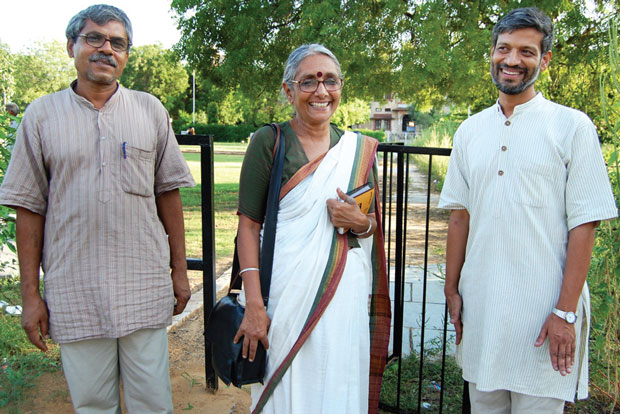
Aruna Roy, Nikhil Dey and Shankar Singh are founder members of the Mazdoor Kisan Shakti Sangathan (MKSS) is a grass roots peoples organisation formed in 1990 with its headquarters in Devdungri, Rajasthan. The MKSS works on the concerns of its primary constituents- peasants and workers, but also engages with wider issues of participatory democracy, and democratic struggle. The peoples struggle for access to official documents which was initiated by the MKSS in rural Rajasthan in the mid 90s has grown from a grassroots movement that triggered broad debate, to a successful nationwide demand for the Right to Information Act, a crucial check against arbitrary governance. The platform of village based public hearings or “Jan Sunwais” pioneered by the MKSS in the mid 1990s has now become an institutionalized means of social audit and democratic participation attested by the Government, Judiciary, C&AG, campaigns and movements across the country. The MKSS has also been a strong supporter and an integral part of the movement demanding the Mahatma Gandhi National Rural Employment Guarantee Act and continue to play a critical role in its oversight. Aruna, Nikhil and Shankar, individually and collectively have been members of numerous committees set up to advise Government on means of institutionalizing transparency and accountability in governance. They are also associated with global advocacy platforms such as the Progressive International, Open Government Partnership, Publish What you Pay etc that work towards strengthening democracy and accountability.
Cheryl D’Souza

Cheryl D'Souza is a human rights advocate and the secretary of the Campaign for Judicial Accountability and Reforms. Her work at the Supreme Court has been on public interest litigation around corruption in the higher judiciary and the need for transparency and accountability of public institutions, the rights of refugees and migrants, communal violence and police accountability. She has recently worked on the cases in the Supreme Court seeking redress for migrant workers after the lockdown, their rights to work, wages, income and the cases on operationalising the various provisions of the Disaster Management Act that provide relief measures for the poor and vulnerable. She is currently also pursuing her Ph.D. from the Vrije University, Amsterdam, on public interest litigation for vulnerable populations and policy development in India.
James Herenj
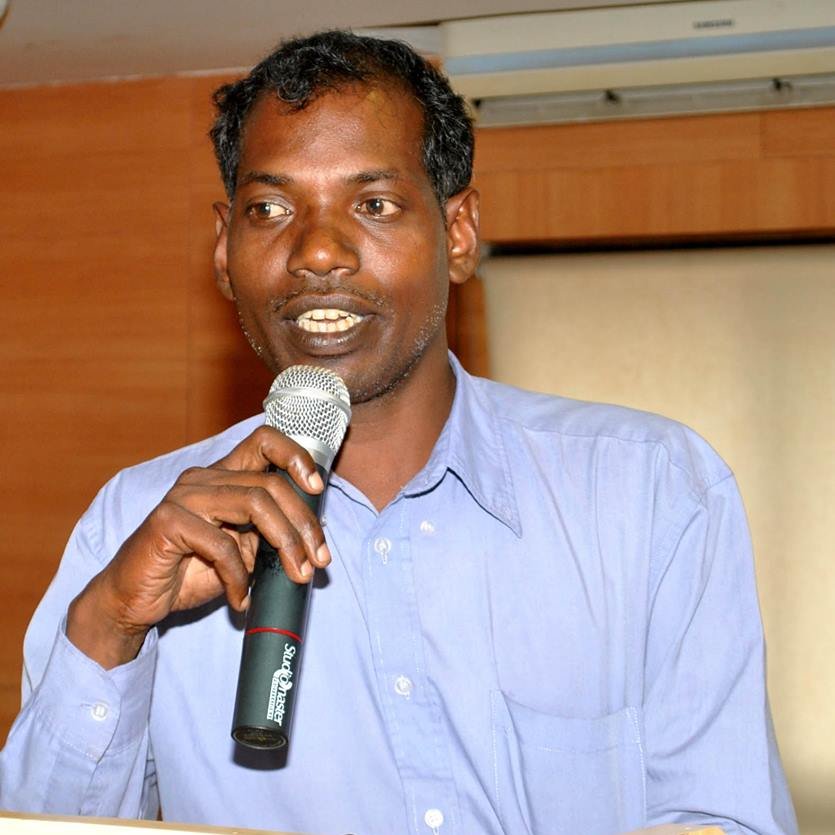
James is a socio-political activist and convenor of NREGA Watch in Jharkhand. He has been working towards ensuring that citizens, particularly Adivasis, are able to access their entitlements in left wing extremist affected areas of Jharkhand. Amongst other initiatives, he has been seminally involved with the conceptualization and running of the NREGA Sahayata Kendra in Latehar District of Jharkhand, which is run by Adivasi activists to facilitate citizens in accessing their right to work under MGNREGA, share actionable and relevant information about the implementation of the programme, and file and pursue grievances. Based on the meaningful impact of the Latehar Kendra, many more Sahayata Kendras have now sprung up in different parts of the State and country. He is also associated with the Right to Food Campaign and NREGA Sangharsh Morcha. He serves as a member of the steering committee of the Social Audit Unit, Department of Rural Development, Government of Jharkhand.
Jayati Ghosh
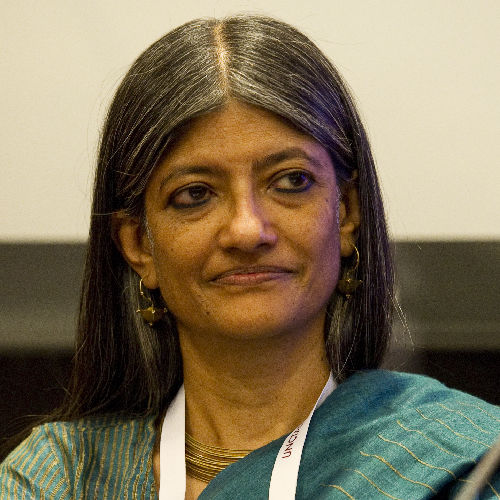
Jayati Ghosh is Professor of Economics at Jawaharlal Nehru University, New Delhi. Her research interests include globalisation, international trade and finance, employment patterns in developing countries, macroeconomic policy, issues related to gender and development, and the implications of recent growth in China and India. She has authored and/or edited a dozen books and around 200 scholarly articles. Recent books include Demonetisation Decoded: A critique of India’s monetary experiment (with CP Chandrasekhar and Prabhat Patnaik, Routledge 2017) and the Elgar Handbook of Alternative Theories of Economic Development (co-edited with Erik Reinert and Rainer Kattel, Edward Elgar 2016). She has received several national and international prizes, including the M. Adisheshaiah Award for distinguished contributions to the social sciences in India in 2015; the International Labour Organisation’s Decent Work Research Prize for 2010 and the NordSud Prize for Social Sciences 2010 of the Fondazione Pescarabruzzo, Italy. She has advised governments in India and other countries at different levels. She was the Chairperson of the Andhra Pradesh Commission on Farmers’ Welfare in 2004, and Member of the National Knowledge Commission reporting to the Prime Minister of India (2005-09). She is the Executive Secretary of International Development Economics Associates (www.networkideas.org), an international network of heterodox development economists. She has consulted for several international organisations including ILO, UNDP, UNCTAD, UN-DESA, UNRISD and UN Women and is member of several international commissions. She has been closely involved in working with progressive organisations and social movements including the Peoples’ Action for Employment Guarantee (PAEG).
Jitendra Paswan
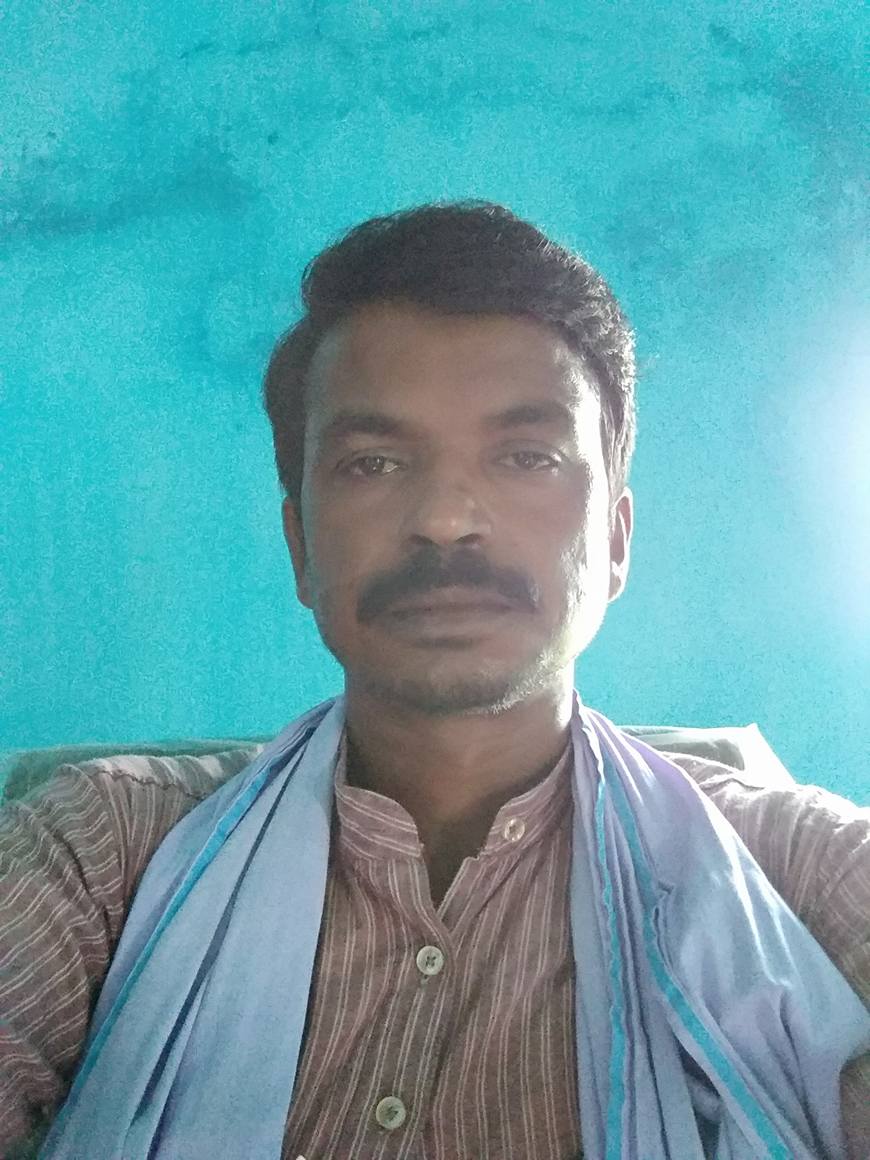
Jiten is an activist and is joint secretary of Jan Jagran Shakti Sangathan, a trade union of unorganized workers in the districts of Araria and Katihar in Bihar. He is a serving Sarpanch of Chitauriya panchayat in Katihar since 2016, secretary of the Block Sarpanch Sangh and vice-president of the District Sarpanch Sangh. Jiten is also a musician and has written, composed and performed dozens of songs that powerfully communicate the messages of workers’ struggles in many public forums. He is also a member of NREGA Sangharsh Morcha, a national platform of workers' collectives, trade unions, organisations and individuals engaged in public action on NREGA. He is also associated with the National Alliance for Peoples’ Movement.
Gautam Bhan
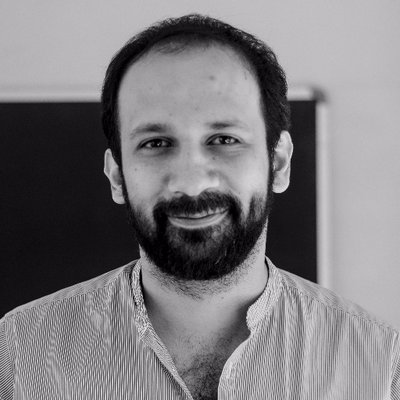
Gautam Bhan is faculty at IIHS and teaches, researches and writes on the politics of urban poverty and inequality, urban and planning theory, housing, and identity and social practice. His previous research has focused on displacement and resettlement of the urban poor in Delhi, and his new work engages with regimes of urban welfare and social security, including work on urban health. At IIHS, he has taught under several programmes, including the Urban Fellows Programme, the Urban Practitioners Programme and the PWP-UD. He is the author of In the Public’s Interest: Evictions, Citizenship and Inequality in Contemporary Delhi (University of Georgia Press 2017; Orient Blackswan 2017), co-editor of the Routledge Companion to Planning in the Global South (Routledge 2018), co-author of Swept off the Map: Surviving Eviction and Resettlement in Delhi (2008), and co-editor of Because I have a Voice: Queer Politics in India (2006), in addition to numerous academic articles.
Nitin Sethi
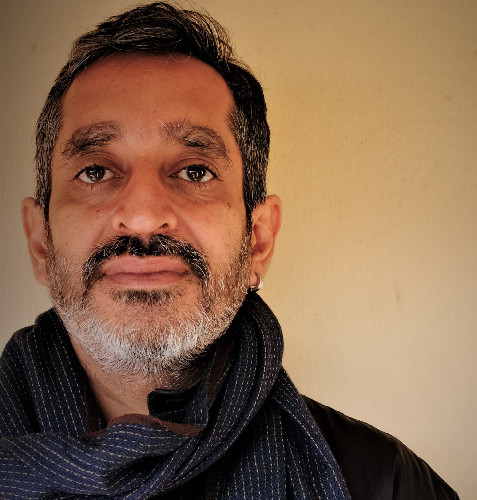
Nitin is an independent journalist and writer. Over the past two decades, he has investigated, analysed and written on the intersections of governance, environment, public finance, development, and India's political economy. He has written previously for Business Standard, The Hindu, The Times of India, Down to Earth magazine and Scroll.in. He has been awarded several international and Indian fellowships and awards for his reportage and investigations on the political-economy, environment, global climate change geopolitics, development, and India's northeast. He teaches journalism and public policy as visiting faculty at various institutions and is a photojournalist when time permits. His homelands by adoption are in Arunachal Pradesh and Manipur.
SM Vijayanand
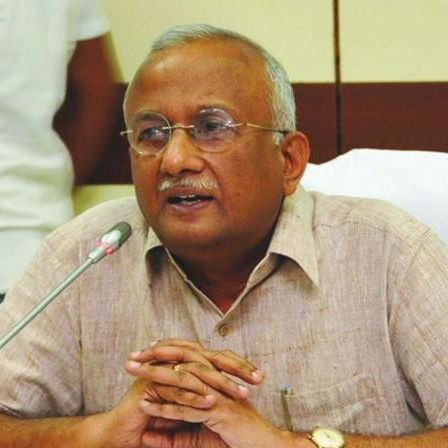
SM Vijayanand is a retired Indian Administrative Officer of Kerala Cadre, batch 1981, and retired as the Chief Secretary of Kerala. Prior to that he served as the Secretary, Union Ministry of Panchayati Raj and Development. He steered the seminal Peoples' Plan Campaign of Kerala that led to the decentralization revolution in the State, in the capacity of serving as Secretary, Local Self Government and Planning Departments in the State. He nurtured the Kerala Institute of Local Administration (KILA) into an international centre of excellence for capacity building in local governance and decentralized planning, especially for elected representatives. He was also directly involved in setting up and mentoring Kudumbashree, the SHG programme of Kerala, which has attained wide acclaim in India and abroad. He has been a supporter and mentor of various rights based campaigns and movements striving towards a more just and equitable life for all citizens.
 Aruna Roy, Nikhil Dey and Shankar Singh are founder members of the Mazdoor Kisan Shakti Sangathan (MKSS) is a grass roots peoples organisation formed in 1990 with its headquarters in Devdungri, Rajasthan. The MKSS works on the concerns of its primary constituents- peasants and workers, but also engages with wider issues of participatory democracy, and democratic struggle. The peoples struggle for access to official documents which was initiated by the MKSS in rural Rajasthan in the mid 90s has grown from a grassroots movement that triggered broad debate, to a successful nationwide demand for the Right to Information Act, a crucial check against arbitrary governance. The platform of village based public hearings or “Jan Sunwais” pioneered by the MKSS in the mid 1990s has now become an institutionalized means of social audit and democratic participation attested by the Government, Judiciary, C&AG, campaigns and movements across the country. The MKSS has also been a strong supporter and an integral part of the movement demanding the Mahatma Gandhi National Rural Employment Guarantee Act and continue to play a critical role in its oversight. Aruna, Nikhil and Shankar, individually and collectively have been members of numerous committees set up to advise Government on means of institutionalizing transparency and accountability in governance. They are also associated with global advocacy platforms such as the Progressive International, Open Government Partnership, Publish What you Pay etc that work towards strengthening democracy and accountability.
Aruna Roy, Nikhil Dey and Shankar Singh are founder members of the Mazdoor Kisan Shakti Sangathan (MKSS) is a grass roots peoples organisation formed in 1990 with its headquarters in Devdungri, Rajasthan. The MKSS works on the concerns of its primary constituents- peasants and workers, but also engages with wider issues of participatory democracy, and democratic struggle. The peoples struggle for access to official documents which was initiated by the MKSS in rural Rajasthan in the mid 90s has grown from a grassroots movement that triggered broad debate, to a successful nationwide demand for the Right to Information Act, a crucial check against arbitrary governance. The platform of village based public hearings or “Jan Sunwais” pioneered by the MKSS in the mid 1990s has now become an institutionalized means of social audit and democratic participation attested by the Government, Judiciary, C&AG, campaigns and movements across the country. The MKSS has also been a strong supporter and an integral part of the movement demanding the Mahatma Gandhi National Rural Employment Guarantee Act and continue to play a critical role in its oversight. Aruna, Nikhil and Shankar, individually and collectively have been members of numerous committees set up to advise Government on means of institutionalizing transparency and accountability in governance. They are also associated with global advocacy platforms such as the Progressive International, Open Government Partnership, Publish What you Pay etc that work towards strengthening democracy and accountability. Cheryl D'Souza is a human rights advocate and the secretary of the Campaign for Judicial Accountability and Reforms. Her work at the Supreme Court has been on public interest litigation around corruption in the higher judiciary and the need for transparency and accountability of public institutions, the rights of refugees and migrants, communal violence and police accountability. She has recently worked on the cases in the Supreme Court seeking redress for migrant workers after the lockdown, their rights to work, wages, income and the cases on operationalising the various provisions of the Disaster Management Act that provide relief measures for the poor and vulnerable. She is currently also pursuing her Ph.D. from the Vrije University, Amsterdam, on public interest litigation for vulnerable populations and policy development in India.
Cheryl D'Souza is a human rights advocate and the secretary of the Campaign for Judicial Accountability and Reforms. Her work at the Supreme Court has been on public interest litigation around corruption in the higher judiciary and the need for transparency and accountability of public institutions, the rights of refugees and migrants, communal violence and police accountability. She has recently worked on the cases in the Supreme Court seeking redress for migrant workers after the lockdown, their rights to work, wages, income and the cases on operationalising the various provisions of the Disaster Management Act that provide relief measures for the poor and vulnerable. She is currently also pursuing her Ph.D. from the Vrije University, Amsterdam, on public interest litigation for vulnerable populations and policy development in India. James is a socio-political activist and convenor of NREGA Watch in Jharkhand. He has been working towards ensuring that citizens, particularly Adivasis, are able to access their entitlements in left wing extremist affected areas of Jharkhand. Amongst other initiatives, he has been seminally involved with the conceptualization and running of the NREGA Sahayata Kendra in Latehar District of Jharkhand, which is run by Adivasi activists to facilitate citizens in accessing their right to work under MGNREGA, share actionable and relevant information about the implementation of the programme, and file and pursue grievances. Based on the meaningful impact of the Latehar Kendra, many more Sahayata Kendras have now sprung up in different parts of the State and country. He is also associated with the Right to Food Campaign and NREGA Sangharsh Morcha. He serves as a member of the steering committee of the Social Audit Unit, Department of Rural Development, Government of Jharkhand.
James is a socio-political activist and convenor of NREGA Watch in Jharkhand. He has been working towards ensuring that citizens, particularly Adivasis, are able to access their entitlements in left wing extremist affected areas of Jharkhand. Amongst other initiatives, he has been seminally involved with the conceptualization and running of the NREGA Sahayata Kendra in Latehar District of Jharkhand, which is run by Adivasi activists to facilitate citizens in accessing their right to work under MGNREGA, share actionable and relevant information about the implementation of the programme, and file and pursue grievances. Based on the meaningful impact of the Latehar Kendra, many more Sahayata Kendras have now sprung up in different parts of the State and country. He is also associated with the Right to Food Campaign and NREGA Sangharsh Morcha. He serves as a member of the steering committee of the Social Audit Unit, Department of Rural Development, Government of Jharkhand. Jayati Ghosh is Professor of Economics at Jawaharlal Nehru University, New Delhi. Her research interests include globalisation, international trade and finance, employment patterns in developing countries, macroeconomic policy, issues related to gender and development, and the implications of recent growth in China and India. She has authored and/or edited a dozen books and around 200 scholarly articles. Recent books include Demonetisation Decoded: A critique of India’s monetary experiment (with CP Chandrasekhar and Prabhat Patnaik, Routledge 2017) and the Elgar Handbook of Alternative Theories of Economic Development (co-edited with Erik Reinert and Rainer Kattel, Edward Elgar 2016). She has received several national and international prizes, including the M. Adisheshaiah Award for distinguished contributions to the social sciences in India in 2015; the International Labour Organisation’s Decent Work Research Prize for 2010 and the NordSud Prize for Social Sciences 2010 of the Fondazione Pescarabruzzo, Italy. She has advised governments in India and other countries at different levels. She was the Chairperson of the Andhra Pradesh Commission on Farmers’ Welfare in 2004, and Member of the National Knowledge Commission reporting to the Prime Minister of India (2005-09). She is the Executive Secretary of International Development Economics Associates (www.networkideas.org), an international network of heterodox development economists. She has consulted for several international organisations including ILO, UNDP, UNCTAD, UN-DESA, UNRISD and UN Women and is member of several international commissions. She has been closely involved in working with progressive organisations and social movements including the Peoples’ Action for Employment Guarantee (PAEG).
Jayati Ghosh is Professor of Economics at Jawaharlal Nehru University, New Delhi. Her research interests include globalisation, international trade and finance, employment patterns in developing countries, macroeconomic policy, issues related to gender and development, and the implications of recent growth in China and India. She has authored and/or edited a dozen books and around 200 scholarly articles. Recent books include Demonetisation Decoded: A critique of India’s monetary experiment (with CP Chandrasekhar and Prabhat Patnaik, Routledge 2017) and the Elgar Handbook of Alternative Theories of Economic Development (co-edited with Erik Reinert and Rainer Kattel, Edward Elgar 2016). She has received several national and international prizes, including the M. Adisheshaiah Award for distinguished contributions to the social sciences in India in 2015; the International Labour Organisation’s Decent Work Research Prize for 2010 and the NordSud Prize for Social Sciences 2010 of the Fondazione Pescarabruzzo, Italy. She has advised governments in India and other countries at different levels. She was the Chairperson of the Andhra Pradesh Commission on Farmers’ Welfare in 2004, and Member of the National Knowledge Commission reporting to the Prime Minister of India (2005-09). She is the Executive Secretary of International Development Economics Associates (www.networkideas.org), an international network of heterodox development economists. She has consulted for several international organisations including ILO, UNDP, UNCTAD, UN-DESA, UNRISD and UN Women and is member of several international commissions. She has been closely involved in working with progressive organisations and social movements including the Peoples’ Action for Employment Guarantee (PAEG). Jiten is an activist and is joint secretary of Jan Jagran Shakti Sangathan, a trade union of unorganized workers in the districts of Araria and Katihar in Bihar. He is a serving Sarpanch of Chitauriya panchayat in Katihar since 2016, secretary of the Block Sarpanch Sangh and vice-president of the District Sarpanch Sangh. Jiten is also a musician and has written, composed and performed dozens of songs that powerfully communicate the messages of workers’ struggles in many public forums. He is also a member of NREGA Sangharsh Morcha, a national platform of workers' collectives, trade unions, organisations and individuals engaged in public action on NREGA. He is also associated with the National Alliance for Peoples’ Movement.
Jiten is an activist and is joint secretary of Jan Jagran Shakti Sangathan, a trade union of unorganized workers in the districts of Araria and Katihar in Bihar. He is a serving Sarpanch of Chitauriya panchayat in Katihar since 2016, secretary of the Block Sarpanch Sangh and vice-president of the District Sarpanch Sangh. Jiten is also a musician and has written, composed and performed dozens of songs that powerfully communicate the messages of workers’ struggles in many public forums. He is also a member of NREGA Sangharsh Morcha, a national platform of workers' collectives, trade unions, organisations and individuals engaged in public action on NREGA. He is also associated with the National Alliance for Peoples’ Movement. Gautam Bhan is faculty at IIHS and teaches, researches and writes on the politics of urban poverty and inequality, urban and planning theory, housing, and identity and social practice. His previous research has focused on displacement and resettlement of the urban poor in Delhi, and his new work engages with regimes of urban welfare and social security, including work on urban health. At IIHS, he has taught under several programmes, including the Urban Fellows Programme, the Urban Practitioners Programme and the PWP-UD. He is the author of In the Public’s Interest: Evictions, Citizenship and Inequality in Contemporary Delhi (University of Georgia Press 2017; Orient Blackswan 2017), co-editor of the Routledge Companion to Planning in the Global South (Routledge 2018), co-author of Swept off the Map: Surviving Eviction and Resettlement in Delhi (2008), and co-editor of Because I have a Voice: Queer Politics in India (2006), in addition to numerous academic articles.
Gautam Bhan is faculty at IIHS and teaches, researches and writes on the politics of urban poverty and inequality, urban and planning theory, housing, and identity and social practice. His previous research has focused on displacement and resettlement of the urban poor in Delhi, and his new work engages with regimes of urban welfare and social security, including work on urban health. At IIHS, he has taught under several programmes, including the Urban Fellows Programme, the Urban Practitioners Programme and the PWP-UD. He is the author of In the Public’s Interest: Evictions, Citizenship and Inequality in Contemporary Delhi (University of Georgia Press 2017; Orient Blackswan 2017), co-editor of the Routledge Companion to Planning in the Global South (Routledge 2018), co-author of Swept off the Map: Surviving Eviction and Resettlement in Delhi (2008), and co-editor of Because I have a Voice: Queer Politics in India (2006), in addition to numerous academic articles. Nitin is an independent journalist and writer. Over the past two decades, he has investigated, analysed and written on the intersections of governance, environment, public finance, development, and India's political economy. He has written previously for Business Standard, The Hindu, The Times of India, Down to Earth magazine and Scroll.in. He has been awarded several international and Indian fellowships and awards for his reportage and investigations on the political-economy, environment, global climate change geopolitics, development, and India's northeast. He teaches journalism and public policy as visiting faculty at various institutions and is a photojournalist when time permits. His homelands by adoption are in Arunachal Pradesh and Manipur.
Nitin is an independent journalist and writer. Over the past two decades, he has investigated, analysed and written on the intersections of governance, environment, public finance, development, and India's political economy. He has written previously for Business Standard, The Hindu, The Times of India, Down to Earth magazine and Scroll.in. He has been awarded several international and Indian fellowships and awards for his reportage and investigations on the political-economy, environment, global climate change geopolitics, development, and India's northeast. He teaches journalism and public policy as visiting faculty at various institutions and is a photojournalist when time permits. His homelands by adoption are in Arunachal Pradesh and Manipur. SM Vijayanand is a retired Indian Administrative Officer of Kerala Cadre, batch 1981, and retired as the Chief Secretary of Kerala. Prior to that he served as the Secretary, Union Ministry of Panchayati Raj and Development. He steered the seminal Peoples' Plan Campaign of Kerala that led to the decentralization revolution in the State, in the capacity of serving as Secretary, Local Self Government and Planning Departments in the State. He nurtured the Kerala Institute of Local Administration (KILA) into an international centre of excellence for capacity building in local governance and decentralized planning, especially for elected representatives. He was also directly involved in setting up and mentoring Kudumbashree, the SHG programme of Kerala, which has attained wide acclaim in India and abroad. He has been a supporter and mentor of various rights based campaigns and movements striving towards a more just and equitable life for all citizens.
SM Vijayanand is a retired Indian Administrative Officer of Kerala Cadre, batch 1981, and retired as the Chief Secretary of Kerala. Prior to that he served as the Secretary, Union Ministry of Panchayati Raj and Development. He steered the seminal Peoples' Plan Campaign of Kerala that led to the decentralization revolution in the State, in the capacity of serving as Secretary, Local Self Government and Planning Departments in the State. He nurtured the Kerala Institute of Local Administration (KILA) into an international centre of excellence for capacity building in local governance and decentralized planning, especially for elected representatives. He was also directly involved in setting up and mentoring Kudumbashree, the SHG programme of Kerala, which has attained wide acclaim in India and abroad. He has been a supporter and mentor of various rights based campaigns and movements striving towards a more just and equitable life for all citizens.
